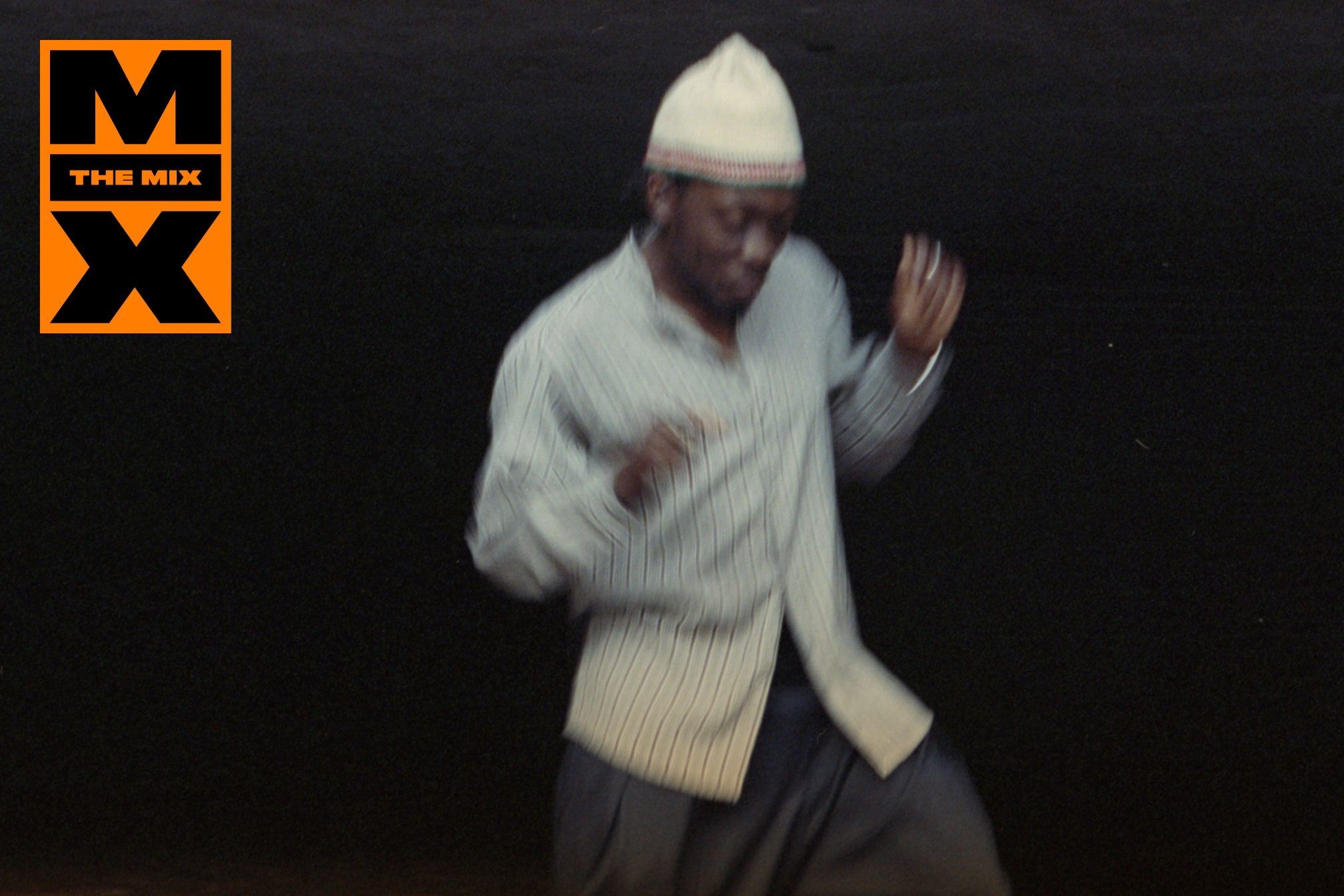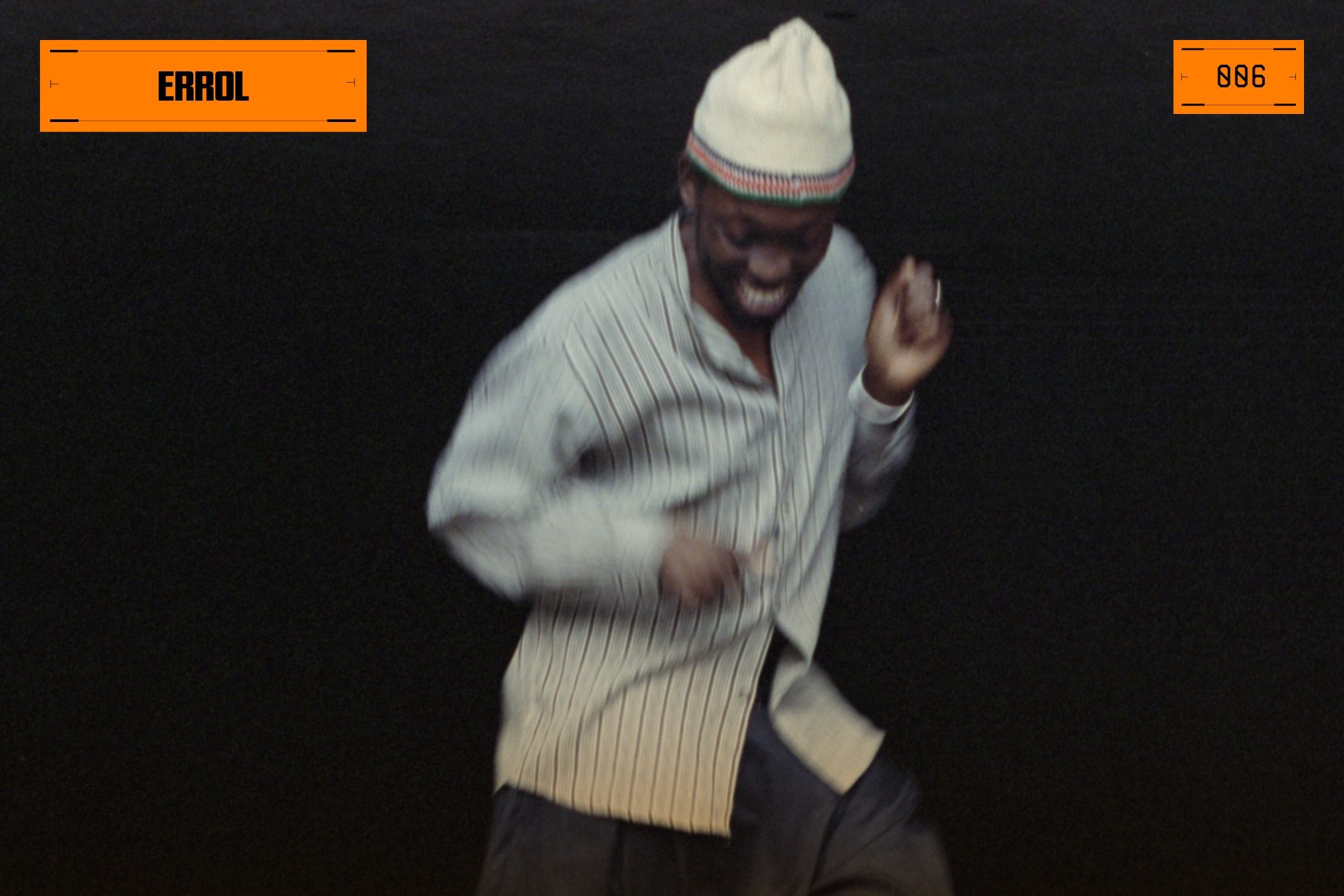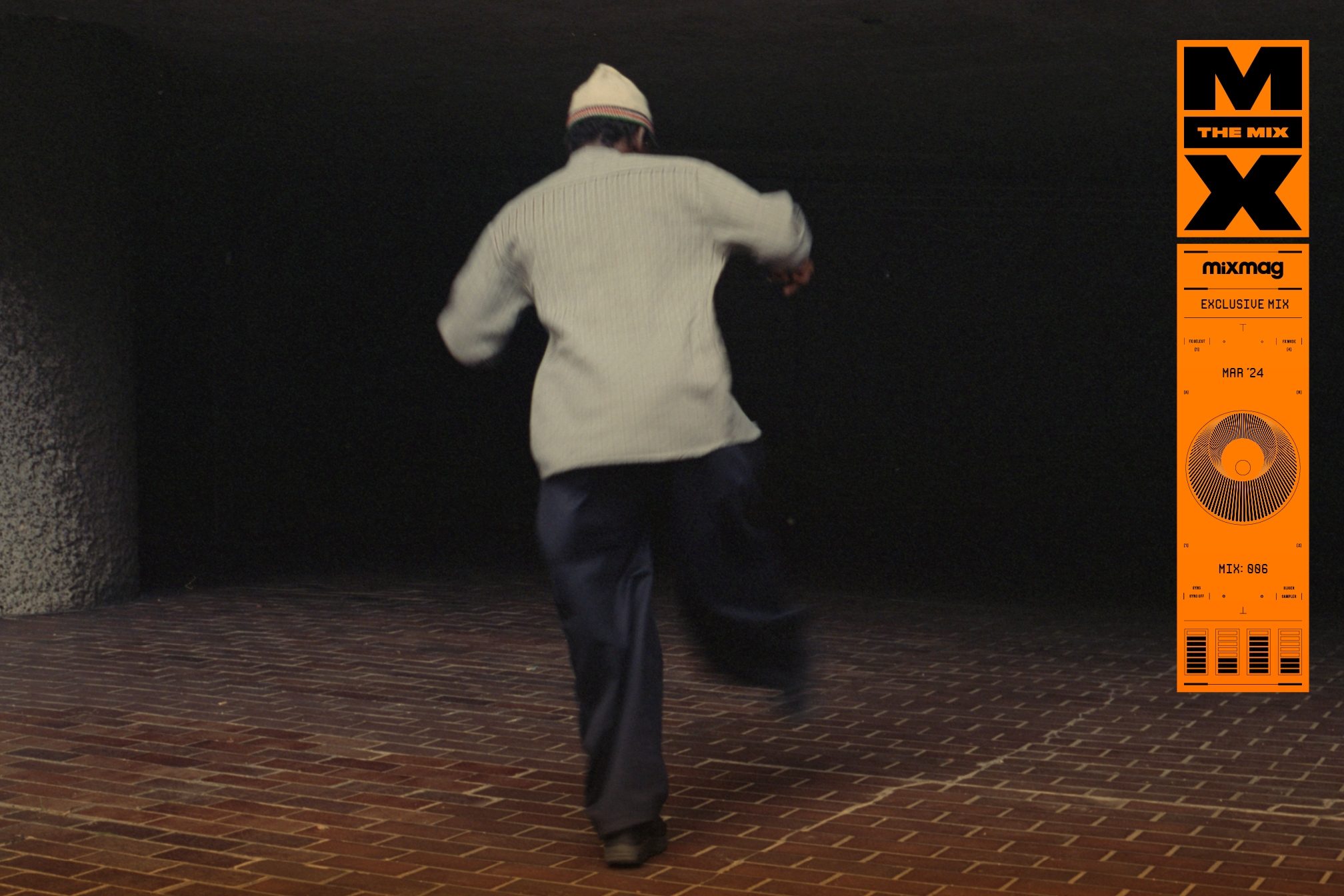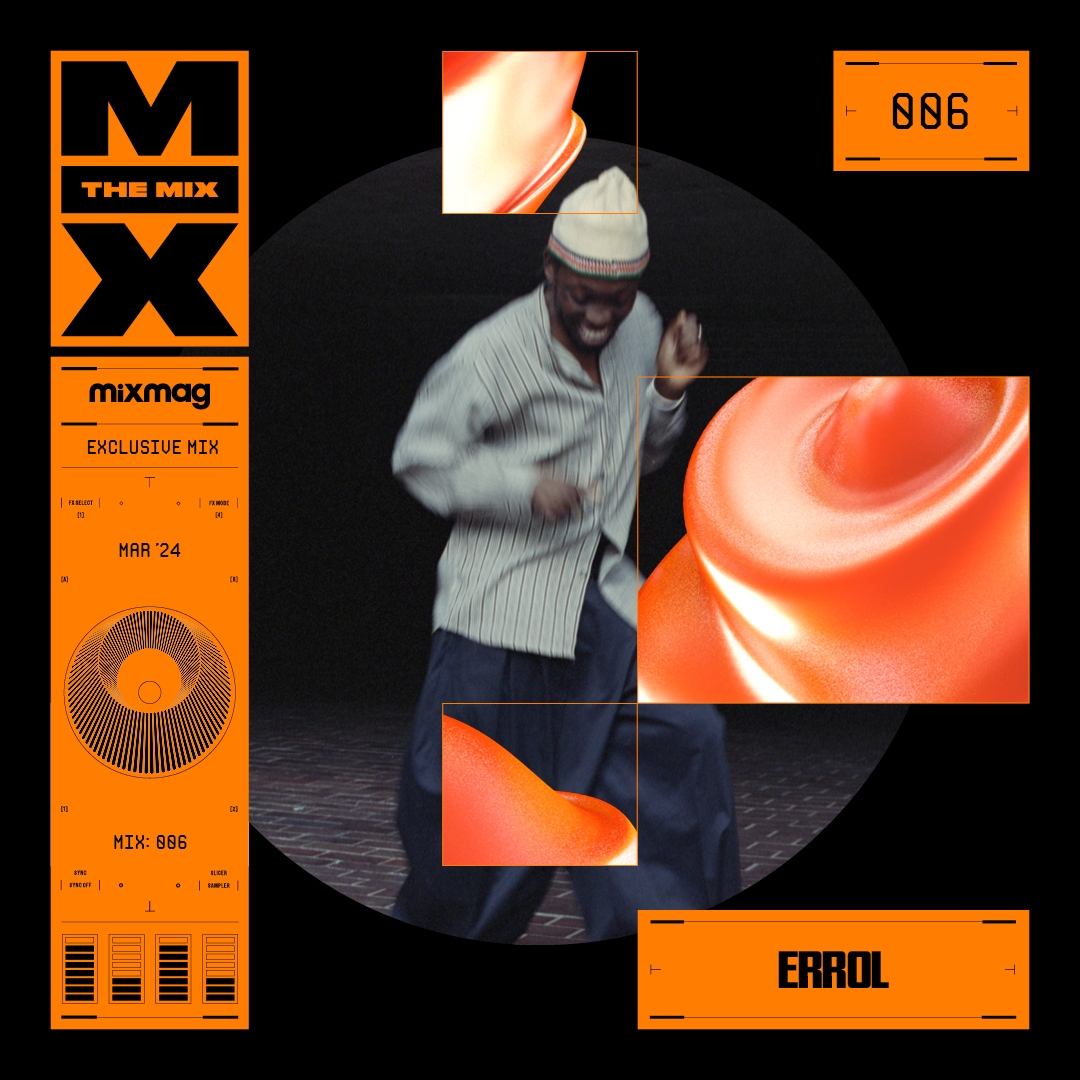 Music
Music
The Mix 006: Errol
Errol mixes a joyride through warm grooves, soulful percussion and more driving sounds, speaking to Yemi Abiade about joining the dots between different music styles, Touching Bass and how community scenes develop
Having just put his new-born son to bed, Errol is in the kitchen preparing dinner when we speak, his mind at ease as he adjusts to life as a parent. A few months in, it’s given him heaps of perspective. “Having a baby really teaches you patience of a kind that you've never faced before,” he muses. “You have a full human to look after. That level of responsibility is daunting, but also exciting.”
Contemplative and considered as he riffs about his journey so far, it soon becomes clear how much connection plays a role in his life. From growing up in Bow, East London, watching local rappers transform into the first generation of grime MCs, to his genre-agnostic work at Boiler Room and working with the vanguard of modern UK jazz – from KOKOROKO to Nubya Garcia – the DJ, curator and founder of Touching Bass navigates space with intention.
He becomes a glue, linking developing music scenes not only with artists soon to blow, but with matters of broader socio-political importance. Resultantly, he has engineered a unique space as a cultural force. It is why he’s been able to spin warm up sets for the likes of Erykah Badu and the late Tony Allen while equally at ease gracing fabric, Horst Festival or Panorama Bar. He’s designed gripping live experiences, whether that's with his talented musical community or leading contemporary art galleries like London’s White Cube for Frieze. Not to mention his recent ventures into the more experiential; playing musical supervisor for the likes of Ronan McKenzie & Joy Yamasungie and Jenn Nkiru, or his protean partnership with specialist speaker-designer, Shivas Brown, as A Loose Ting. Errol has firmly inserted himself among the great modern community builders and musical polymaths, shaping a vision of modern London nightlife with intention.
Read this next: Touching Bass is empowering Black artists to freely express themselves
In the same breath, you can’t talk about the recent history of the city’s club scene without sparing a moment for Touching Bass. Since its 2016 inception, it has cultivated a loyal following based on the foundation of connection through music, a space for expression without critique. The result has been profound as the club night has expanded to become a fixture on NTS Radio, a live concert series (most recently in partnership with The Barbican) and a record label, releasing its ‘Soon Come’ compilation album in 2022. In it, the likes of keiyaA, Ego Ella May and DJ Harrison floated across soul, spiritual jazz and warm house vibrations, retaining a soulful pulse that is the movement’s bread and butter.
Despite being a fixture in the UK capital, Touching Bass has planted seeds far from the metropole, its worldly vision seeing Errol and his partner Alex Rita reach as far and wide as Australia, Japan and New Zealand to form like-minded musical bonds. The fruits of which are a broader, musically diverse global fraternity.
Through both his solo and group ventures, Errol has turned a nascent curiosity for music from his youth into a profession, a calling that evolves unpredictably with every passing day. As a DJ, he remains adventurous. Having recently played his first all-night set (outside of Touching Bass) at South London venue The Carpet Shop, with an exciting film/installation project as well as other opportunities on the horizon, he is on his way to establishing himself further.
We spoke to Errol about his musical upbringing, Touching Bass and why physical space matters in music.

Do you think your heritage has informed your musical journey?
Tremendously. My parents are Caribbean, my dad's from Jamaica, my mum's from Grenada. I grew up with a very rich diet of Caribbean music, but also soul, funk and country was being played in the house. All of that formed such a strong foundation for me as I went on to discover my own pockets of music: grime, hip hop, dubstep, garage, liquid drum 'n' bass. Growing up in Bow, I could hear all of it.
From an early age, I also went to Notting Hill Carnival on a regular basis and seeing that level of multiculturalism and joy being attached to music and dancing has become a touchpoint for so many things that I do.
What are the moments that defined your music journey coming up?
My obsession with Ruff Sqwad, Dot Rotten and Low Deep instrumentals from secondary school onwards was a big one. Don’t get me wrong, I love my favourite MCs but I became transfixed on those producers’ sonic palettes and understanding of space. If you listen to Wiley’s ‘Eskimo,’ the hi-hats aren’t necessarily skittering and frenetic. It’s almost like they’re counterweights, and by being so they give more space to that iconic bassline and everything else. Grime was probably the first time I started compartmentalising different musical elements within songs, questioning why certain choices were made, you know?
Discovering J Dilla was a massive, mind-warping experience. After NSync’s ‘Girlfriend,’ I remember Erykah Badu’s ‘Didn’t Cha Know’ being one of the first CDs I owned. Or maybe my dad had it, and I just claimed it for myself. Either way, I definitely didn’t know anything about Dilla back then. It wasn’t until my prime teens that I really ventured deeper into hip hop beyond the classics. Somehow I came across an artist called AFTA-1 who used to make a series of mixtapes called ‘Love Is Real’ and it really opened my ears to a new side of hip hop, including Dilla, The Foreign Exchange, Nujabes, Madlib and so many more.
I definitely had a few moments in front of my Packard Bell, just tearing up because I was realising that this is what music can feel like. The emotion within Dilla’s music was so palpable. Naturally, I eventually fell into jazz via the samples I was hearing on those tracks and you already know how deep that black hole is.
How do you think your musical tastes have changed over time?
Once I started joining the dots between different scenes and musical styles, it made listening and understanding different genres that bit easier. It actually took me a while to get into house, for instance. I think that's perhaps a result of my environment at the time and also youthful ignorance; not knowing its origin story. Like, I understood and loved UK funky but didn't necessarily put two and two together. Where UK funky met tribal house or deep house was eventually how it started to click. I got into folks like DJ Perempay and I'd be hearing DJ Gregory or Osunlade next to Crazy Cousinz in his mixes.
Techno took me a bit longer, but once I started to realise how soulful it could be, it also started to make sense. Theo Parrish, Marcellus Pittman and all those guys. Jaunty, rugged grooves; much like a cousin of grime. I have to give a massive shout out to Josey Rebelle and Alexander Nut’s Rinse FM shows at the time for contextualising it all for me. I probably had some spliff-in-hand, profound moment when I realised that all this music is speaking a similar language - hip hop to jazz or jungle to jazz. Different forms of story-telling. My partner, Alex, was the one who held my hand into ambient and new age music a few years ago. When we first started going out, she started introducing me to all this music which I’d never really paid attention to. I used to just think it was a bit aimless and plonky, but I’m converted.
Read this next: Ambient music has become a soothing soundtrack to turbulent times
You've been at the forefront of so many burgeoning musical movements both in the UK and abroad - how do you make sense of developing scenes when you're in the midst of them?
I was speaking to the amazing Emma Warren about this some time ago. To be honest, I’ve been lucky to see, say UK jazz at its embryonic stage but I can’t say the same for many other scenes. I’ve been privy to some micro-scenes while they’re bubbling, but to say I was there at the really pivotal, early moments for broken beat or other bits? Nah. I wish I was though. Emma has been around for more revolutions. Speaking to her made me realise there are certainly a set of parameters that allow a scene to really develop and become a thing. Physical space, one or more multiple pioneers, the community gatherers behind the scenes and space to experiment. There’s always some revolutionary tweak disguised under a mistake.
In your mind, what are some of the ways in which music builds communities?
Well, music has always been that gel. At its best, a real reflector of the times. It’s amazing that you can walk down the street wearing a T-shirt from your favourite band or record label, and someone else can instantly get you and potentially what you’re about. T-shirts are like walking billboards in that sense. I’ve been lucky enough to be part of numerous musical communities and there’s such safety in knowing you can go to a space, loosen the shackles and free up unnu self. That’s what has always made Touching Bass so beautiful to me, for instance. Having our own community has also raised questions about sustainability. What does ‘community’ really look like beyond the buzzword of the past few years? How do you continue fostering it after the five-year mark when some friends have moved on and others are having babies? How do you continue to speak to multiple generations? We only have a small team, but where we have capacity we want to dive deeper into our own definition of it. Find other ways to connect, create opportunities for those around us. Work in progress.
In my opinion, one other thing about music communities is the importance of physical space. Online community is so sacred and valuable too, but there’s nothing like the synchronicity of breathing the same air and occupying the same dancefloor. I’m so curious and excited to see how the next generation tackles that balance. While away in Barbados seeing Alex’s family recently, I mentioned that I might go back to school to study something in this realm because it is fascinating. If there’s a course on anthropology, music history, neuroscience and curation dialled into one, let me know.

You’ve travelled the world playing music, what are some of the musical discoveries you didn’t see coming?
Going to Japan and hearing Japanese grime. While I was working at Boiler Room, I had the opportunity to host Skepta’s ‘Konnichiwa’ album launch in a Tokyo record store called Manhattan Records. Hearing mandem on the other side of the world being influenced so much by the sound that they want to take it and make it their own and hearing them spitting at 140 BPM in their native language. It was crazy, especially coming from Bow. I feel like I've grown the most as a person when I’ve gone to different parts of the world and seen how people spend the same 24 hours differently.
You’ve found immense success as a curator working with the likes of Jenn Nkiru, Boiler Room and other institutions - how does curation for a space like 180 Strand compare to a typical DJ set?
What excites me most about curation - whether it’s for an institution or a DJ set - is the conversation between elements. Playing with contrast. The joy is in the details. Working with Jenn on the Black To Techno film was such an eye-opening experience. She is, in my opinion, an oracle. A visionary. It felt like a real privilege to work alongside her. The level of detail and research she brings and expects from every project is a true lesson, and that has set the bar extremely high when it comes to curating elsewhere.
It’s funny that you say ‘immense success’ when I still feel like I’m only starting when it comes to the level of curation I would like to explore. Programming is one thing, but I want to get more experiential and cerebral as I continue to learn; with music as an anchor but also finding other ways to communicate. I’d love to explore different artistic mediums, working alongside people who, like Jenn, are Power Rangers in their field, so I can just learn.
Switching gears to Touching Bass, has your mission changed over time? If so, how?
At its root, Touching Bass has always been about trying to connect people and creating space. As the years have gone on and we've developed as artists and people, we've gotten more ambitious. Ultimately, we're still trying different ways of speaking to that same message; whether that’s through a radio show or curating a gallery exhibition. Same goal, the same ethos, the same energy.
The Touching Bass record label released it's ‘Soon Come’ compilation in 2022. How has being a label owner affected your view on the music you push?
I think for as long as I can remember, I've always wanted Touching Bass to be a label and a megaphone for who we are and what we're about. A lot of the music that we've been releasing has been quite eclectic in terms of style and geography. Going forward, I’m pushing even further to make the releases a reflection of the sounds heard on our dancefloor as well as the music that soundtracks your down time. That duplicity is really interesting to me, and ultimately it’s about sharing music that moves people.
It's been important for us to really question why we're still running a label in a time where an artist can promote and share their music themselves. But I think the reason why we're still here and the reason why we still want to release music is because we feel like we can act as a network builder for artists and as we continue to grow, our ability to facilitate ideas also grows. If either of those things stop happening, I’ll know it’s time to do something else. I used to be so hellbent on being one of those labels that puts out a gazillion records, but as Yvonne Turner recently said, ‘100,000 tracks are released a day, that’s pollution’. I’d much rather Touching Bass be a buy-on-sight imprint, and that means quality over quantity.
Read this next: The Mix 005: SAMO
What are some memories attached to Touching Bass that you hold dear?
Our first We Out Here Festival takeover in 2019. We’ve been blessed to pretty much be a festival resident since it started, and for the first three editions, we really made a home out of the forest stage. The setting just seemed perfect for us and the way we like to play; the feeling of playing in a woodland, under the tree canopies made things feel otherworldly at times. I’ll always remember how good the sound was that first year.
It was myself and Alex, Ruby Savage and Theo Parrish playing. Theo is such a major influence for so many of us, so to have him come and play was insane. What’s even more insane is that the year before, I'd been on Facebook saying Theo Parrish is going to play at Touching Bass one day, then it literally happened the next year. It's just mesmerising to see him on form. There's such courage to the way that he plays. A fearlessness that I’ve tried to take on myself. He’ll be playing some crazy jazz-funk song and then go into some opera, some techno. The way he blends those chapters is so exciting. He plays with so much heart. He had such kind words to say about what we’re doing as well. That was a special night.
What are some of Touching Bass’ plans for 2024?
Last year felt like consolidation and working on our systems. We’ve been doing Touching Bass for a little while now, and if you want longevity you have to keep interrogating your why and how. From throwing parties to running a team feels so adult but also super rewarding. Daniel and Carli - our day to day team - are both great minds, so we just want to keep empowering them to take the reins.
We’re collaborating with Tayo and Rohan - longtime Touching Bass OGs - on our first film project. I can't say too much about that just yet, news will be revealed, but that's something that we've had on the moodboard for a long time. Seeing the vision coalesce has to be one of the most fulfilling things that I’ve ever witnessed and as I say earlier, this is the direction of experiential storytelling that I’d like to dive into more. I don’t know if bigger is always better, but we’ll try finding more ways of growing alongside the people that we love, incorporating new people into that as well. And hopefully continue to connect with different parts of the world.
Shifting things back to you, what are some of your favourite records to play during a DJ set?
Over the last few years, my sound has widened to incorporate the driving and high-spirited, slightly harder sounds as well as the gloopy, soulful and percussive end of the spectrum I’m known for. I thought I’d heard a lot of Volcov’s Neroli and Archive discography, for instance, but I was diving back into some more from Nubian Mindz and KemeticJust/Just One and found some real gold in that realm.
I’m always trying to find ways to sneak in bits that pay homage to my heritage, and the polyrhythmic energy of soca works so well into electronic riddims, kuduro, UK funky and even techno when timed right. Classics like Collin Lucas’ ‘Dollar Wine’ feel like a breath of light, fresh air after you’ve been getting a bit hard and tech-y. For me, it’s just about playing with the right colours at the right time, and I’ve been increasing the colour palette so I can hopefully paint some better pictures.
I see you just did your first all night DJ set at The Carpet Shop a few weeks ago - can you tell us about it? What's next for you?
I hadn't done an all-nighter outside of Touching Bass before and in mid-2023, I remember looking at my 2024 goals and thinking, ‘how can I continue to challenge myself?’ For a large proportion of 2023, I was lacking a lot of confidence in myself as a DJ. Just getting too into my own head about career and progress. At one point, I just had to remind myself that the left-of-centre path that I’m on is beautifully individual and if I just remain true to myself, hopefully people will gravitate.
The all-nighter sold out in under a week. That breathed new life into my lungs and reminded me how lucky I am to have such support around me; from friends, supporters and strangers that became co-pilots. The night was everything I could have wished for and I'm still reflecting on it all. There's a particular resonance that occurs most powerfully on small, intimate dancefloors. It's the reason that the vast majority of Touching Bass' dances remain that size. I always love how the dancefloor breathes throughout the night too. The ebb and flow of bodies. There was something particularly connective about that night, which I'll hold close for a long time.
It reminded me of another recent favourite dance. A few months ago, I played at Doka in Amsterdam and after my set, a complete stranger came up to me and said he could see my heart glowing when I played. That’s like the biggest compliment because I've always worn my heart on my sleeve when I play. The more vulnerable I get behind the decks, the more that people feel like they’re just joyriding around every corner with you.
Anyways, shouts to Matt and the rest of The Carpet Shop team for being such a pleasure to work with! More solo plans to come (alongside the Touching Bass pursuits of course)!
What can you tell us about your mix?
After having a little break to welcome my son into the world, I've been relishing the opportunity to play out again. This mix is pretty indicative of where my mind is at musically right now. Percussive, groovy and a bit of a joyride (as I always like it). Also finding time to dip into the darker, heavier shades of my taste towards the end before finding the light again. Shouts to all the artists for making this incredible music.
Yemi Abiade is a contributing editor at Trench and freelance writer, follow him on Twitter

Tracklist:
Recloose - Kapiti Dream
Atjazz - Parallels (feat. Dawne B) (Charles Webster Remix)
Sir Soundbender - Gotta Save Yourself (TBT Mental Mix)
Boddhi Satva - Big Theme
K2 - Klap Track
J.A.E - Love Me Right (Ezel Remix)
Joi Cardwell, UDAUFL - Be Yourself (Manoo Main Remix)
Joe Claussell - Git Wa
Kenny Bobien - Reachin’ (Ian Friday Tea Party Club Mix)
Josh Wink - Don't Laugh (Manoo's Laugh Remix)
Nicholas - The Music Lives
Heidi Vogel - Turn Up The Quiet (IG Culture Remix)
Floorplan - Let The Church
Deetron - Zoom
Jon Dixon - Can’t Stand It
Fit Siegel - Seedbed
Meftah - Peace Go With You


